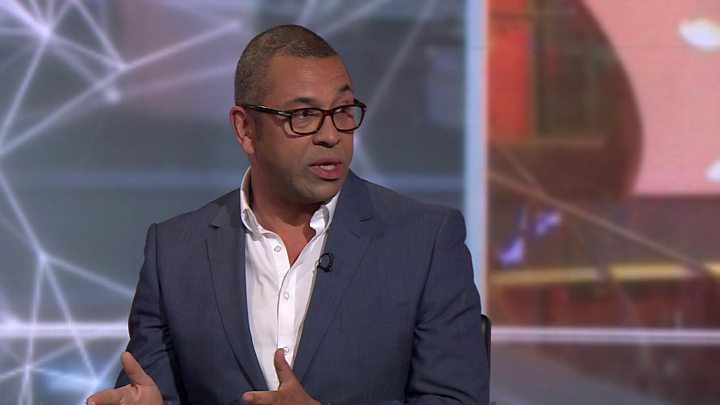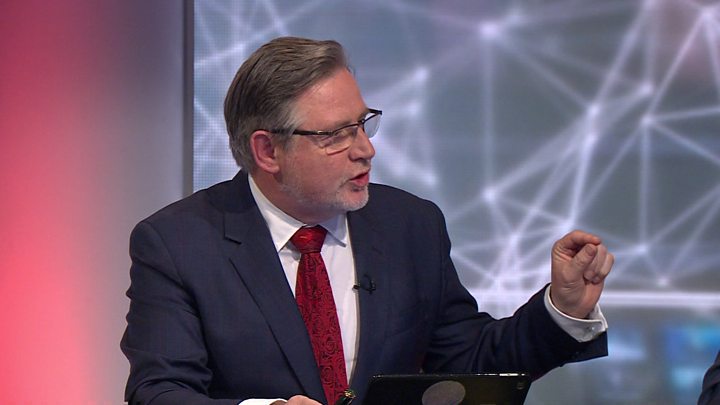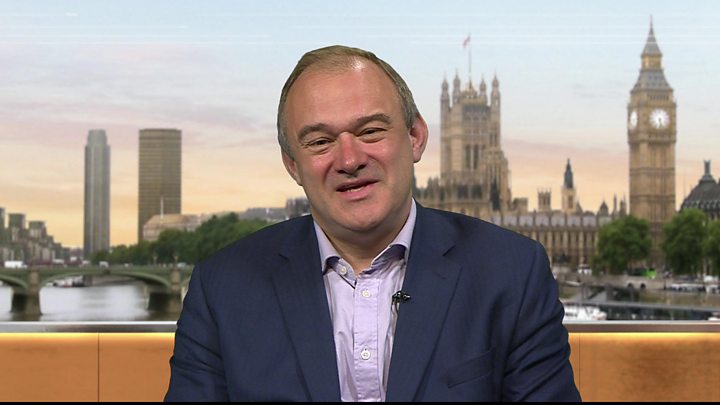Local elections: Main parties hit by Brexit backlash in polls

Media playback is unsupported on your device
The Conservatives and Labour have faced a backlash at the ballot box over the Brexit deadlock, with smaller parties and independents winning seats.
Results are coming in after local elections in England and Northern Ireland, and national politics seems to have been a deciding factor for voters.
The Tories have lost nearly 450 seats and 18 English councils so far, many of them to a resurgent Liberal Democrats.
Labour has also had a disappointing night, losing about 80 seats to date.
MPs have yet to agree on a deal for leaving the European Union, and as a result, the deadline of Brexit has been pushed back from 29 March to 31 October.
While local elections give voters the chance to choose the decision-makers who affect their communities, the national issue looms large on the doorstep.
Brandon Lewis, Conservative Party chair, said voters had given his party a very clear message they were “fed up” with the Brexit deadlock and “they want us to get it done”.
Polls took place for 248 English councils, six mayors and all 11 councils in Northern Ireland.
About 110 English councils had declared by 07:30 BST, with the other 140 or so results expected throughout Friday.
The Northern Irish results will take longer to come in. No local elections are taking place in Scotland and Wales.
BBC political editor Laura Kuenssberg said the results so far suggested both of the two main parties are being punished for their handling of Brexit, with the Liberal Democrats, Green Party and independents benefitting from their losses.
The Conservatives have lost about 440 seats so far, with some predicting that could rise to at least 800 by the end of the day.
The Lib Dems have already gained 300 seats – and control of eight councils – but it is still too early to assess the overall picture.
North/south divide
Polling expert Prof Sir John Curtice agreed it would be the smaller parties celebrating on Friday.
“One of the major features of the 2017 general election was that, between them, the Conservatives and Labour dominated the election, winning over 80% of votes – the biggest combined share since 1970,” he said.
“We might be saying those days are over. It looks as though the key message from the voters to the Conservatives and Labour is ‘a plague on both of your houses’, as they find themselves losing both votes and seats on an extensive basis.”
But he warned it could be even worse for the two main parties at the European elections on the 23 May, when “new kids on the block”, the Brexit Party and Change UK, also compete for votes alongside the Greens and Lib Dems.
Prof Curtice said there was a north/south divide emerging in the losses too, with the Conservatives shedding more seats in the South – especially in areas that voted Remain – and Labour losing more in the North.
Ex-minister Crispin Blunt said the Conservatives’ performance had been more “resilient” than many people had expected but there could be a “very different outcome” in European elections later this month unless “there was a clear strategy to get Brexit over the line”.
He told BBC Radio 4’s Today the question of how long Theresa May would stay in power would “rumble on”, causing “significant instability” for the party.
Conservative party chairman Brandon Lewis said he was “very sorry” that Conservative councillors had lost their seats because of public anger over the Brexit impasse.
He said “all parliamentarians” had a responsibility to “honour and respect” the 2016 referendum result and he hoped the current talks with Labour would agree a way forward within weeks.
He rejected suggestions Mrs May was an impediment to a breakthrough, saying she was “determined” to see through the process.
Key developments so far:
- The Conservatives have lost control of 18 councils – including Peterborough, Basildon and St Albans. Labour has lost control of three – Hartlepool, Bolsover and Wirral
- Labour has also lost its mayoral post in Middlesbrough to an independent
- The Conservatives have won two councils – Walsall and North East Lincolnshire – both of which had no party with overall control before
- The Liberal Democrats have gained eight councils – including Winchester, North Norfolk, Cotswold and Bath and North East Somerset
- Labour has won one council – Trafford – a former Conservative stronghold
- Where independent candidates have been standing, they have won on average 25% of the vote – and independents have taken control of two councils – Ashfield and North Kesteven
- The Green Party has gained 42 councillors so far, while UKIP has lost 54
- Turnout is averaging just one or two points below the last two local elections, reversing predictions of a major drop off in voters
Labour MP Andrew Gwynne said it had been a “tough set” of elections for the party, which has lost about 80 seats so far, and Brexit had played a part.
“For many people, it was their first opportunity to express that sense of frustration and the two main parties have borne the brunt,” he told BBC Radio 4’s Today.
But he rejected calls from a number of pro-Remain MPs, including Jess Phillips and Ben Bradshaw – for the party to more overtly endorse another referendum.
“It is not a bad thing for a party that seeks to govern in the national interest to want to want to bring together our polarised and divided society,” he said.

Media playback is unsupported on your device
But Labour MP Ruth Smeeth said voters just don’t believe the party will deliver Brexit.
She added: “My frustration is that we seem to have abandoned [voters]. No matter how hard we are working locally, we need clear messaging from the top and playing around just isn’t working.”
Lib Dem MP Wera Hobhouse described the results for her party so far as “fantastic”.
“Voters have given their verdict on Brexit to the two main parties,” she said. “The European elections are around the corner and after this exceptional night, we will do very well in the European elections because voters will come to the Liberal Democrats as a true Remain party.
“It is our big night. We have made the biggest gains since 2003. The Liberal Democrats are back.”

Media playback is unsupported on your device
Green Party co-leader Sian Berry said she was confident her party would end the day with a “record number of councillors on a record number of councils”.
She told BBC Breakfast the Greens were not simply benefiting from a protest vote over Brexit and their gains reflected “huge new concerns” about climate change as well as the strength of their local campaigning on a range of issues.
And UKIP’s Mike Hookem said his party was taking votes from both the main parties too, adding: “We’ve had two years of turmoil. We’re back on the rise again.”
This is the biggest set of local elections in England’s four-year electoral cycle, with more than 8,400 seats being contested.
A further 462 seats are up for grabs in Northern Ireland.
It’s not over – it’s far, far from over.
Many hundreds of seats are yet to declare. Many individual political stories yet to be told. So be very aware – the final shape of wins and losses for the government and the main opposition is unclear.
But at this stage of the morning, there is one message to both of the main parties at Westminster from this enormous set of elections – it’s not us, it’s both of you.
Local elections are about different issues in our villages, towns and cities. But at count after count, Tory and Labour candidates have been paying the price for Westminster’s failure so far to settle the Brexit question.
Council leaders from both parties are saying openly that voters can’t trust them any more because of how they have dealt with the issue – whether that is a sentiment among Leave voters in Sunderland who don’t trust that we’ll ever leave, or Remain voters in Bath who are furious that we likely will.
Or more simply maybe, this is a verdict on the competence of Westminster’s biggest parties – on the mess of handling Brexit.
Of the 248 elections in England, 168 have been district councils which are in charge of setting and collecting council tax, bin collections, local planning and council housing.
There were also elections taking place for 47 unitary authorities and 33 metropolitan boroughs which look after education, public transport, policing and fire services, as well as all the services of district councils.
In Northern Ireland, councils are responsible for services including local planning and licensing, waste collection and enforcing safety regulations to do with food, workplaces and the environment.
Either search using your postcode or council name or click around the map to show local results.




